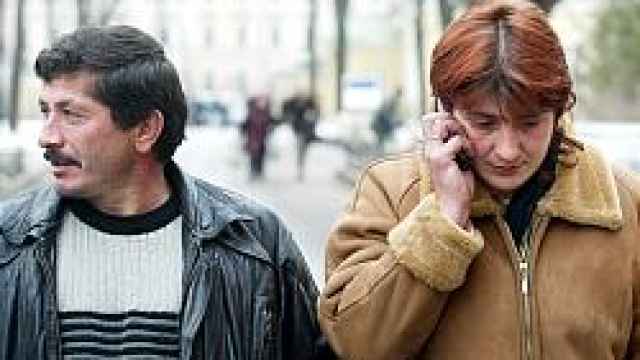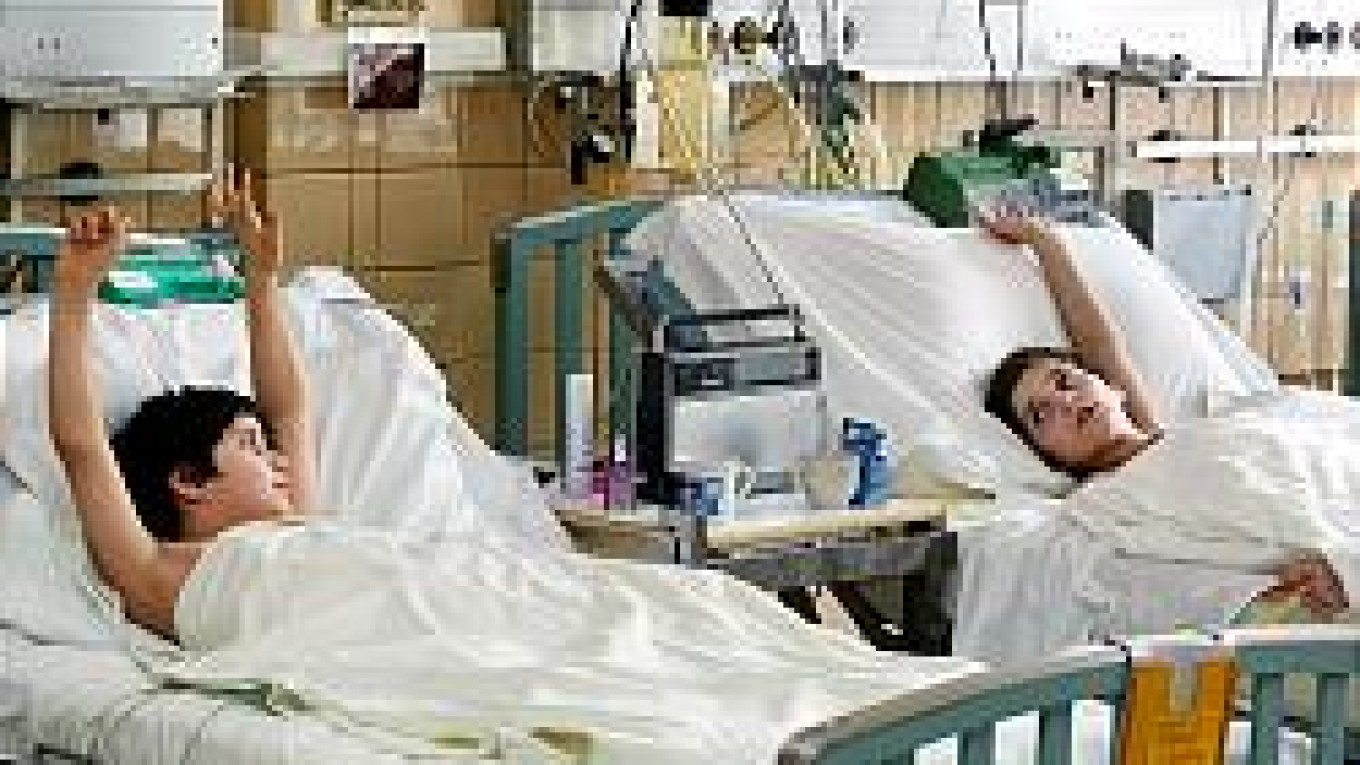The 11-year-old Siamese twin sisters had just been separated in a grueling 10-hour procedure conducted by a team of 23 surgeons. It was the first surgery of its kind in Russia, separating twins who shared internal organs.
The Rezakhanova sisters, from Bishkek, Kyrgyzstan, were born attached at the abdomen and pelvis. They shared several internal organs, including intestines and reproductive organs, as well as two good legs and an inoperable third one.
Siamese twins are the result of a rare embryological accident. A developing embryo begins to split into identical twins but then halts the process midway, leaving the partially separated egg to mature into a fetus. Most conjoined twins are stillborn, and those that survive the birthing process often die within a few hours.
Separation is a risky undertaking, especially if the twins share internal organs. Even if one of the twins dies during surgery, the procedure is still considered a success. By this standard, the Rezakhanova sisters practically sailed through the operation.
"They have all the usual complications most children develop after complex surgeries," said Dr. Yury Isakov, head of the Filatov's pediatric surgery department. "But they are fine."
It has been a long road for the twins and their mother, Zoya Rezakhanova. Modern technologies allow doctors to spot conjoined twins at the early stages of pregnancy, most of which are then aborted. However, Rezakhanova did not have access to quality health care in 1992. During her pregnancy, her doctor told her she was carrying a baby girl, a very large baby girl.
After the girls were born, Rezakhanova began seeking medical help to separate her daughters. She consulted a handful of Western clinics over the past 11 years, but couldn't find anyone to undertake the risky manipulation for free. The Rezakhanovs make their living by selling their garden vegetables at the market, and they don't have the resources for such an operation.
Rezakhanova consulted a group of German surgeons last year. After conducting detailed tests on the sisters, the doctors then agreed to separate them for 250,000 euros, or $267,000. The family had to decline.
In January, when Rezakhanova brought her daughters to Moscow, she had almost given up hope of finding a doctor who would take on the procedure.
But when the Filatov surgeons examined the patients, they were heartened by what they saw. Their findings confirmed the tests conducted by the German doctors: Each girl had a roughly equal chance of survival through the separation process.
 Igor Tabakov / MT The twins' parents are worried about finding decent medical care back in Kyrgyzstan. | |
"We had all the necessary technology," Isakov said. "Our surgeons and anesthesiologists were all there. There was no reason for us to turn them down."
The doctors were also won over by each twin's ardent desire to lead a life of her own. "While they were little they felt comfortable together," Isakov said. "But as they grew into two individuals, each with her own personality, their condition turned into torture for each of them."
For years, the girls lived separately from their family in Bishkek, in a hospital, since their condition required special medical treatment. They never attended school. Only Gita can read.
Intensive care doctors have refrained from asking the twins about their past, to avoid traumatizing them during recovery.
"It is clear that the life of these girls has never been easy," said Dr. Irina Belyayeva, head of the intensive care unit. "From now on, it should become easier. But more complicated at the same time."
Each girl now has one leg, and since they have scant bone or tissue to which doctors can attach a prosthetic, they will likely remain that way, Belyayeva said. And they will probably encounter the same difficulties that most disabled people face in Russia and CIS countries -- ranging from a lack of specialized public facilities to miniscule government payments.
"I'm not sure their mother understands the scale of the problems she will have to deal with," Belyayeva said.
Rezakhanova said that she certainly worries about finding decent medical care for her daughters at home. But to her mind, expectations have already been exceeded. "One thing I already gave up on was seeing each of my children live on her own like any other human being," she said.
Isakov said Tuesday that the girls were recovering faster than the doctors had expected. He transferred them from intensive care to a regular ward ahead of time on Monday. He plans to discharge them in a week, as they do not require rehabilitation in a specialized clinic yet.
"They need to get home and have a break from the hospital for at least six months," Isakov said. "They need to get used to their new condition, have all the affected organs and tissue heal and restore their functions."
From there, Isakov contended, the possibilities are endless. "When they grow up, they can become just about anything they want to."
A Message from The Moscow Times:
Dear readers,
We are facing unprecedented challenges. Russia's Prosecutor General's Office has designated The Moscow Times as an "undesirable" organization, criminalizing our work and putting our staff at risk of prosecution. This follows our earlier unjust labeling as a "foreign agent."
These actions are direct attempts to silence independent journalism in Russia. The authorities claim our work "discredits the decisions of the Russian leadership." We see things differently: we strive to provide accurate, unbiased reporting on Russia.
We, the journalists of The Moscow Times, refuse to be silenced. But to continue our work, we need your help.
Your support, no matter how small, makes a world of difference. If you can, please support us monthly starting from just $2. It's quick to set up, and every contribution makes a significant impact.
By supporting The Moscow Times, you're defending open, independent journalism in the face of repression. Thank you for standing with us.
Remind me later.


